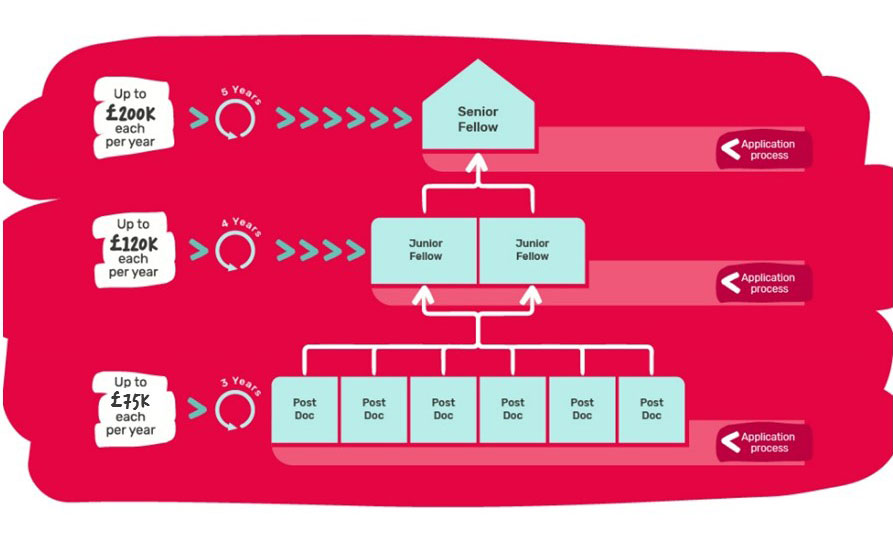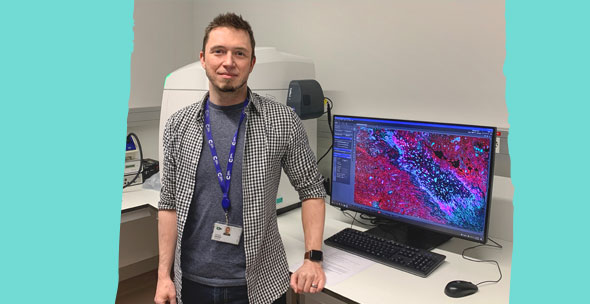When the pandemic hit we remained firm in our commitment to accelerating a cure, but needed to prioritise the research we’d already committed to. Thanks to the generosity and support of our community we’ve been able to maintain these grants (as well as crowdfund our pioneering ARISTOCRAT trial!) and it’s time to expand our research portfolio once again!
So, as we join the world in adjusting to the constant challenges of COVID, we’re taking our much anticipated next step to open opportunities for new research – starting with our Future Leaders grant round.
What’s so special about our Future Leaders grant?
Our goals of doubling survival and halving the harm done by brain tumours are extremely ambitious. If we’re going to achieve them, we need to make sure exceptional researchers are attracted to the field of neuro-oncology – now and in the future.
We developed our Future Leaders grant to support excellent academic and clinical researchers who are just beginning their careers, so they can establish themselves as leading experts in brain tumour research.
Over 12 years, the step-changing funding programme could provide the right researcher with up to £1.7million in funding, as well as the support needed to set up their own lab and drive the directions that brain tumour research takes in the future.
By returning to traditional grant funding with our Future Leaders programme, we’re reaffirming our commitment to invest in the future of brain tumour research and build a workforce of excellent scientists and clinicians who are dedicated to defeating brain tumours.
We had a fantastic response from the research community, with a record 39 applications at the first stage. We’ll now be asking our Scientific Advisory Board to identify the most promising candidates, who we’ll invite to submit a full application. We anticipate awarding up to 6 grants in this round in the autumn.

Meet our current Future Leaders

Dr Veronica Rendo
Read about how our up and coming research leader Dr Veronica Rendo is working to fight GBM resistance to drugs called MDM2 inhibitors.
Dr Rendo is a biologist with a PhD in Medical Science and is based at the Dana-Farber Cancer Institute in Boston, USA. Our Future Leaders funding enticed her to move from studying cancer genetics and targeted therapy, in colorectal cancer, into the brain tumour field.
Veronica told us “I believe that a key component of a successful academic training is to be part of diverse scientific communities where expertise in a certain field can be gained. This also allows [me] to understand how different perspectives can be combined to tackle a particular scientific question. For this reason I have decided to pursue each stage of my training in different laboratories, spanning Venezuela, Sweden, Singapore and The United States. Each workplace has provided me with diverse levels of infrastructure and support to move my projects forward. My international career has also allowed me to establish a constantly increasing network of researchers who have provided invaluable input and support for the development of the diverse projects I have been involved in.”
She’s now using her extensive expertise to look at how glioblastoma cells respond to a type of drugs, called MDM2 inhibitors (known as MDM2i). In the first year of her grant she’s found that response to MDM2i drugs changes depending on a type of p53 protein in the cell. She’s following this up by looking at cells that react differently to each other and exploring how these differences occur.

Dr Tyler Miller
Dr Miller has started a project to learn how brain tumours are manipulating the body’s immune system and how to make them susceptible to immunotherapies.
Dr Miller holds both an MD and a PhD, meaning he has expertise in both the clinical and academic aspects of brain tumours. As a pathologist he is able to diagnose a brain tumour, and as a researcher he is dedicated to finding better treatments, sooner.
Tyler shared this with us – “My entry into brain cancer research was somewhat by default, but my experience with brain cancer patients as a clinician and personal connections to those affected by brain cancer has motivated to me to dedicate my career to finding a cure for these patients. Together, my scientific and clinical training and personal experiences have provided me with a foundation and motivation for a lifelong career in brain cancer research.”
The goal of his Future Leaders research project is to discover how to harness the power of the immune system to attack the tumour, specifically focused on immune cells in the tumour called myeloid cells. These “tumour-associated myeloid cells” can suppress the immune system and prevent it from attacking the tumour.
In just the first year of his three-year grant, Dr Miller has been able to distinguish differences between immune cells that fight against the tumour and those that are making the brain a tumour-friendly environment. This new knowledge will help him focus on testing which drugs (immunotherapies) can turn the whole immune system against the tumour.

Dr Spencer Watson
Early-career researcher Dr Spencer Watson is using our Future Leaders funding to tackle GBM recurrence by targeting the damage left by treatments.
Dr Watson is a Postdoctoral Researcher in the Department of Oncology at the University of Lausanne, Switzerland. His research in the lab of Professor Johanna Joyce focuses on how the brain tumour microenvironment responds to current therapies and how this can lead to tumour recurrence.
Spencer told us:
“I was very fortunate to discover science at an early age and find that I had some talent for it. I have also been lucky enough to have some amazing scientific mentors during my career who inspired me to take on big ambitious goals, and taught me that the point of science was to make a difference.
“So I wanted to focus on problems that needed the most urgent help. And beyond a doubt, that field was brain cancer research. There has been so little improvement in treatment for patients for so long, and I hoped that I could change that. I don’t believe that any problem is insurmountable, and by working with charities, fundraisers and patient advocates I think we can make a real difference to patients’ lives.
“We’re investigating how the tumour microenvironment around glioblastomas (GBMs) may be encouraging growth – and importantly how to stop it. We’ve discovered in preclinical models of GBMs that tumour recurrence always occurs right next to so-called ‘glial scars’ that form during treatment, so we’re testing the idea that glial scars may create a protective area for surviving tumour cells that also reprograms the microenvironment to drive rapid tumour recurrence. It’s our hope that by repurposing currently approved drugs to target the microenvironment of brain tumours, we can improve how patients respond to standard treatments now – and not ten years from now.
“Being part of the Future Leaders programme is vital to my goal of making a meaningful contribution to improving outcomes for GBM patients. Not only does the generous support scheme allow me to attempt highly ambitious projects, but the connections and communication with other Future Leaders creates a collaborative network that helps all of us reach our goals.“

